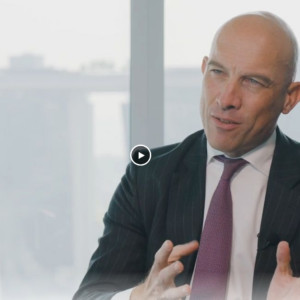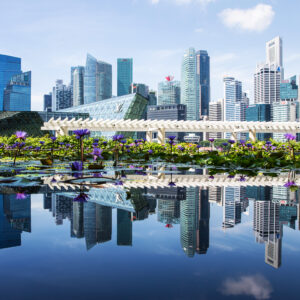How ‘Mr West End’ is giving London’s unloved buildings a new lease of life

Entrepreneur Asif Aziz talks diversity, ESG and giving back to the community.
As a billionaire entrepreneur, with origins in the ‘Global South’, Asif Aziz represents the ideal demographic which the largest wealth managers say they will be targeting in coming years.
Private bankers are gradually realising their key target customers are self-made, wealthy clients coming from the Middle East, Asia, including Muslim countries such as Pakistan, Indonesia, Malaysia, Bangladesh, and Africa, says the Malawi-born entrepreneur.
Speaking from his London office in St James’s, Mr Aziz highlights Muslim multi-millionaires as a particularly attractive target market for UK private banks.
Known as ‘Mr West End’ for his successful real estate speculation in London, Mr Aziz has achieved financial fame as founder and CEO of Criterion Capital. This high-profile property company, employing 1000 staff, owns and manages an expanding £4bn ($5bn) ‘prime’ portfolio, centred around London’s iconic Leicester Square, through to Piccadilly Circus. He combines an acumen for spotting undervalued bargains with a passion for environmentally friendly developments.
His focus is buying and developing “end of life buildings and derelict spaces”, before repositioning them as hotels or affordable flats. “As London tries to retain its position as leading financial centre of the world, it has to mirror and reflect the culture of much of the international capital that flows into the city,” he says. It is critical, believes Mr Aziz, for successful companies to be truly diverse at all levels. Rather than employing a few token high-profile ‘ethnic’ employees, such a policy should embrace the boardroom, senior management and all customer-facing roles, to cater for diverse customers and stakeholders.
With Mr Aziz's family companies being clients of several private banks, he believes these players should do much more to help minorities “get on the entrepreneurial ladder” and fund rising start-ups. “Entrepreneurs contribute to society and the more diverse group of businesspeople they are, the better the world will be, so that everyone will be represented.”
But diversity alone will not ensure success, stresses Mr Aziz, with entrepreneurs needing a combination of “hard work and ethics”, plus a sense of self-denial, giving up “many passions” in order to hit the big-time. “Anyone who is successful has given up something,” he maintains, explaining his children believe he has become a “prisoner of his own success”, forsaking the freedom to take part in sporting pastimes. “One must decide what is important to oneself and choose the sacrifices that need to be made to succeed in business.”
In many ways, work has substituted leisure activities and become his “24/7 hobby”. “It’s a pleasure and I am good at it, or at least some aspects of it,” he says, adding he has surrounded himself with a crowd of “very bright” colleagues to share the load.
Windowless hotels
Raised in a culture where the relationship with real estate is “deep-rooted”, his passion for property started at age 16. He acquired two shops in Deptford, south-east London and converted the upper parts, used as storage, into maisonettes. Buoyed by this initial success he moved to Angola for 12 years. Here he made his fortune through the setting up of food manufacturing and distribution businesses. Back in the UK in 2005, Mr Aziz founded Criterion Capital, and started converting empty office buildings to flats, before shifting his focus to the capital’s glamorous West End, where he began repositioning derelict office buildings into hotels.

He describes ‘repositioning’ the Trocadero Centre, a London landmark near Piccadilly Circus that stood empty for more than 10 years, as his “proudest” achievement in business. From 2020, the immense building has been home to the 721-room Zedwell Piccadilly, a pioneering windowless hotel “focused on sleep by cutting out all distractions”, offering tourists “affordable accommodation in central London”. This is the result of his determination to re-use the building’s “deep, windowless floorplate”.
The next stage involves rolling out this concept into other “forgotten spaces” in London and beyond, starting with Tottenham Court Road, where he turned two stories of under-utilised subterranean car parking into a 187-room hotel.
Property development and environmental, social and governance (ESG) investing are a match made in heaven, he believes. “Windowless hotels use more than 20 per cent less energy than conventional hotel rooms, due to reduced heat loss through the walls and windows, and reduced solar gain that causes overheating,” he says. Thermal gains are even greater underground, since heat loss to the ground is minimal, explains Mr Aziz, who now owns nine hotels with 2300 rooms and more than 1600 flats.
Retain and reuse
The “climate emergency” is the main catalyst to reshape priorities of developers and tenants, he believes, urging the industry to take more responsibility to help alleviate the crisis. While central governments and local authorities need to set standards, property tycoons also need to step up and play a more significant role in the green transition, says Mr Aziz.
One hope is the UK government will introduce more policies encouraging developers to reuse and repurpose buildings, rather than demolish them. While knocking down and rebuilding is often cheaper, the big problem afflicting the sector is people’s perception that “best-in-class products are shiny office blocks with floor to ceiling windows, and modern new builds.”
Tenants and corporates need to understand that a restored old building, or “class A refurbishment”, is equally attractive, he says, stressing that his company has never demolished a building. “I have always understood the importance of conserving – prioritising, reusing and recycling – over demolishing and rebuilding from scratch,” confirms Mr Aziz, speaking approvingly of companies adopting ESG policies that set “ambitious sustainability goals”. Both tenants and contractors are demanding more “sustainable solutions” from the building industry, both during construction and operation, he claims.
Working alongside The Crown Estate, Criterion Capital is “pushing hard to adopt emerging technologies, and commit to ambitious carbon reduction targets,” says Mr Aziz, while admitting some of these technologies are only just emerging. This can make technical implementation a major challenge.
Despite Brexit and the Covid-19 pandemic, he remains confident London will retain its resilience as a “global magnet for investment in both commercial and residential property”. The current relocation trend from Canary Wharf into the City is freeing up existing, huge office buildings which could be transformed into a “fantastic, affordable residential areas”, benefiting from a good transport network.
The rise of working from home means the Square Mile is also “overstocked with office buildings that should be repositioned into residential and hotels, to regenerate the area and bring 24/7 life,” he says, believing it is essential for employees to go to the office, to share ideas and innovate.
Giving back
Because of his non-traditional ethnic background in the City, Mr Aziz says he faced “greater” challenges along the entrepreneurial path. Yet he has been motivated by “trying to turn something negative into positive”, achieving “financial survival”, and giving back to the community.
In 2015, he created the Aziz Foundation, promoting social justice, inclusion and equal opportunities for the expanding British Muslim community – 3.9m, or 6.5 per cent of the population, predicted to grow to 13m by 2050. With an age profile highly skewed towards the younger age bands, British Muslims were hit particularly hard by the cost-of-living crisis. Even before the Covid-19 pandemic, more than 50 per cent of them were living in poverty, compared to 18 per cent of the general population.

Over the years, the foundation has granted more than 600 scholarships for Masters degrees, although only one in 20 applicants secures the scholarship. More recently, it started granting internships to talented individuals, to help “Muslim untapped talent” become more employable by “prestigious” financial institutions.
“Inclusivity is essential for the survival of mankind. I feel so strongly about it,” says Mr Aziz, who has mixed-race children. “I'm seen as a rock star hero in my community,” he adds, laughing. “I want to be remembered for my foundation. That’s my legacy. I want to do more for British Muslims. But the way to do it is to celebrate their successes, rather than talk about prejudice.”
Among other initiatives, his foundation sponsored the aerial Ramadan lights in March last year, on display over major streets in London, ahead of the Islamic holy month of fasting.
It took 10 years to obtain planning permission to convert two floors of the Trocadero into a mosque, but Mr Aziz’s desire will soon become a reality. “Muslims pray on the streets and in restaurants, which is shameful,” he says. While many of the objections to this plan received by Westminster City Council were fuelled by racism and Islamophobia, his vision is for “a peaceful haven that welcomes people from all faiths to gather, pray, meditate and learn”.
He is also passionate about promoting peace in the Middle East. “Civilian death is tragic on both the Israeli and Arab side,” he says, stressing the importance that people do not export these problems outside the warzone, creating further divisions in the world.
Learning from mistakes
Despite his public commitments to ESG principles, Mr Aziz has attracted ferocious media criticism, accused of using Isle of Man-registered companies to buy properties, especially pubs, in London, and then close them to be replaced by lucrative housing developments. In 2020, The Times asked if Mr Aziz was "the meanest landlord in Britain", for his treatment of insolvent commercial tenants during the pandemic.
Mr Aziz explains that during lockdown he had to meet financial obligations, and that none of his private tenants were evicted. He also says he never owned any pub. “I have never been worried about people’s perceptions,” he adds. “You can never make everyone happy,” he says, adding he does not have the “trappings of wealth”.
Google’s reviews also indicate some of his firm’s tenants are not happy, with many volunteering poor scores for the performance of Mr Aziz’s property company.
“The greatest lesson I've learned is that I will continue to make mistakes until the day I die, and I continue to persevere,” he says, with all entrepreneurs guaranteed to fail at some stage on either financial, social or political issues.
Mr Aziz remains his own “biggest personal critic”, he says. “I hate this negative energy that I create from criticising myself. But it helps me get better and stronger and [make sure] I don't make the same mistake again.”
One of the biggest mistakes wealth managers can make, he believes, is ignoring this massive entrepreneurial and diverse pool of capital – and its associated innovations – which he represents.



